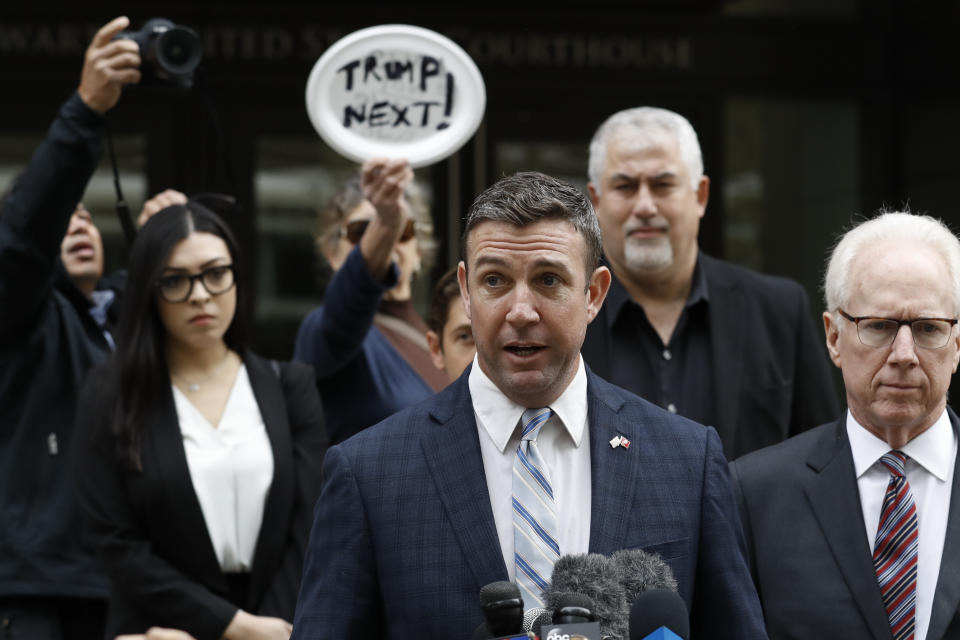Here’s what happens to a candidate’s money when they drop out
Sen. Kamala Harris suspended her campaign Tuesday afternoon, telling supporters in an email that her campaign “simply doesn’t have the financial resources we need to continue.” While the former California Attorney General lagged behind rivals like Senators Bernie Sanders and Elizabeth Warren, Harris had raised nearly $37 million by the end of September, with $10.5 million cash on hand, according to her most recent FEC filings.
But what will happen to all that money now that her campaign is over? Can a candidate just keep the money? The answer is: not exactly.

According to the Federal Election Commission (FEC), there are several permissible things that a candidate can do with the money they’ve received while fundraising. They can use it for moving expenses, pay campaign staff, purchase gifts of “nominal” value to those who aren’t a member of their family, donate it to charity, move it to a state or local party committee, transfer it to a future campaign, or to a state/local candidate.
In Harris’s case, for example, she may choose to roll over funds to her Senate campaign when she is up for reelection in 2022.
Candidates can also return funds to their donors, but that might be easier said than done.
“Sometimes, they do [give it back],” says Ann Ravel, former chair of the FEC. “I wouldn’t say it’s the usual thing to do. But I have seen it. For me, that seems to be the appropriate way to go, though obviously, it might be a difficult computation problem.”
Ravel also noted that candidates infrequently use the money to give to charity.
“It seems to be more common that they’ll give it to other political party committees to be used in their self interest in some ways,” she says.
What a candidate can’t do, the law makes clear, is use campaign funds for personal use.
But it does happen.
Ravel says she knows of “many cases” during her time at the FEC where candidates would use campaign funds for personal use, often trying to make it appear that they were doing campaign activities.
Campaign finance law expert and Stetson University Law Professor Ciara Torres-Spelliscy says candidates can be “sorely tempted, and put it in their own pockets, or buy things they think will be fun for themselves and their family.”
She points to Duncan Hunter, the congressman from California who is pleading guilty to campaign finance fraud. In one instance, Hunter allegedly used campaign funds to purchase plane tickets for his family rabbit Eggburt.

Torres-Spelliscy says that the FEC is a “toothless agency,” making it that much harder for campaign finance law to be enforced. With three Democrats and three Republicans, she explained the agency often just “deadlocks,” preventing the commission from even moving forward with an investigation.
“A lot of unscrupulous candidates know this,” she added.
Sometimes, candidates keep the money flowing from their campaigns, long after they’ve stopped running for office. An investigation earlier this year from the Tampa Bay Times discovered some 50 campaigns that were still paying for goods and services, despite a candidate not running.
These “dormant” campaigns, Ravel says, are a “really big issue,” pointing out the case of Hawaii Rep. Mark Takai whose campaign continued to pay people — even though he had died.
A big problem is the inability of the FEC to investigate or enforce the law, Torres-Spelliscy says. Right now the FEC has lost its quorum, meaning there aren’t enough commissioners to vote on investigations. Of the six available seats at the FEC, three are currently vacant.
“It doesn’t help the rule of law to have the primary regulator of money and politics dysfunctional during a presidential election,” she says. “I find that so alarming.”
Kristin Myers is a reporter at Yahoo Finance. Follow her on Twitter.
Read more:
Black Friday protesters hit back with ‘Buy Nothing Day’
Charlamagne tha God addresses black voters considering Trump: 'Who wants to be a rich slave?'
US taxpayers spent almost $1 billion incarcerating innocent black people
Trump campaign raises millions during impeachment hearings
Republican states best at managing their money; Democratic ones the worst
Read the latest financial and business news from Yahoo Finance
Follow Yahoo Finance on Twitter, Facebook, Instagram, Flipboard, LinkedIn, YouTube, and reddit.
